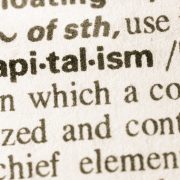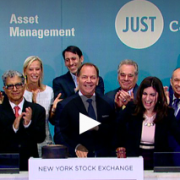Peggy Noonan recently wrote a Wall Street Journal column under the title Republicans Need To Save Capitalism. She is right that someone needs to take on the role of making the case for capitalism, but wildly, spectacularly, crazily wrong to identify a political party as a potential source of an intellectual argument.
In The State, Anthony de Jasay states his belief that capitalism has never succeeded in effectively asserting the moral worth and social utility of the right to private property. This, he says, explains why
in the face of an essentially adversary state and its accompanying ideology, capitalism has shown so little intellectual vigor in its own defense, and why such defenses as it has managed to muster have been poor advocacy, lame compromises and sometimes offers of honorable surrender.
The consequence, according to de Jasay, has been the “mute defeatism” of the capitalists, and submission “to the role of political underdog”.
There is no excuse for this defeatism. Private property, entrepreneurship and the creation of value for others in an economy of consumer sovereignty – where the consumer controls what is produced by demonstrating their preferences through buying or not buying – creates the most beneficent society. It is far preferable to state capitalism, where the interventions of the state are not only inefficient, but unjust: favoring the interests of its own employees, dependents and partners over those of the citizenry.
As F.A. Hayek points out in The Intellectuals And Socialism, governments recruit the schoolteachers, university professors, journalists and media producers, think tank scribblers and assorted talking heads to make The State’s case for socialism. Under the terms of this case, capitalism is evil exploitation of the majority of the populace, via depressed wages, diversion of resources into capitalist profit, and misuse and malinvestment of financial flows. The State surrounds us with this anti-capitalist case from the time our children enroll in schools (where content and meaning are carefully controlled to produce submissive, dependent, ideologically aligned subjects), through higher education, to 99% of media outlets (all of which are effectively state-licensed). All of these content platforms become regulated utilities, carefully controlled, licensed, and supervised by The State. We can easily see how Google, Amazon and Facebook are moving towards this regulated utility status. For example, imagine the Stalinist intent of the House Of Commons Digital, Culture, Media And Sport Committee. This committee, in an official report, referred to these companies as “digital gangsters”, which tells us all we need to know about the level of self-restraint they will exert when considering their regulatory scope.
In fact, the “regulated utility” image is probably applicable to most of our big companies, including those who serve the government directly (like the military-industrial complex companies), those who depend on regulation for their permitted profits (like the energy and transportation sectors), and those who seek to benefit from various government protections (like the automobile companies who live under the 25% tariff against imported pick-up trucks, to mention just one of many interventions).
If the intellectuals and chattering classes are fully employed in attacking capitalism, and the capitalists themselves have been captured, who is going to make the positive case? It certainly won’t be the Republican Party or any other political entity. All political entities and actors – among which we may include Ms. Noonan – are the enemies of capitalism. Politics is opposed to both capitalist economics – the system that elevates the living standards and quality of life for billions over time – and the capitalistic individuals who dedicate their lives to serving others by creating new economic values for them, enhancing lives one at a time.
The only source of energy for this case is from the entrepreneurs themselves. It’s the entrepreneurs who are the heroes of the free market system, whose innovations raise the standards of health, nutrition, safety, productivity, education and art for everyone. They do so because they see a profit opportunity: profit is the signal from the customer that there is value in an innovation that they are willing to pay for, and that it’s a better use of society’s resources than was the case before its invention. The entrepreneur who puts society’s resources to more productive use is rewarded by consumers. But not immediately. The entrepreneur makes sacrifices, defers income, invests his or her own money, works hard, takes risk and grapples with uncertainty that has deterred or baffled others. Finally, they bring the fruit of their labor and capital investment to market and receive their verdict. That verdict encourages them to produce more or to go back to the drawing board / lab / incubator to try harder. They’re high achievers because they try hard and refuse to give up in their quest to create new value.
They won’t be writing elegant op-eds, and most of them won’t be book authors, and they’re not penning academic white papers. They’re not producing movies celebrating entrepreneurship. (The movies that are made about entrepreneurs are usually made by intellectuals, like Steve Jobs, written by Aaron Sorkin from the book of the same name by Walter Isaacson. Being intellectuals, they had to skewer the hero.)
There are exceptions like Ken Langone (who bravely wrote a book called “I Love Capitalism!”) and Andy Puzder, who are willing to write and talk on camera about the merits of capitalism. John Tamny is a media entrepreneur who is a reliable defender of capitalism.
But the greatest service the entrepreneurs can give to the defense and celebration of capitalism is to continue to do the great work that they do. Every instance of a profitable entrepreneurial transaction is a bell rung loudly for a better society: for empathy, for collaboration, for aspiration, for morality, for the highest and best use of human talent, for creating new knowledge, for sharing, for making excellent use of technological innovation, for purpose and meaning, for giving a fellow human being a needed service, for delivering a value that was previously denied to them.
Let the entrepreneurs do what they do, and let customers celebrate by buying what they produce. If we are able to interconnect – not just transactionally, but intellectually – the world of customers with the world of entrepreneurs, the people who are the creators of new value in society, we will be able to raise the understanding of how entrepreneurs change the world for the better in accordance with customer wishes. If all these customers and all these entrepreneurs share their learning and experiences, then we’ll arrive at a new horizon of appreciation for capitalism. We’ll understand spontaneous order, the driving dynamic of entrepreneurial human action, the never-ending process that constantly spreads and furthers the advancement of civilization
And we’ll render the anti-capitalist intellectuals and anti-capitalist politicians irrelevant and obsolete.













